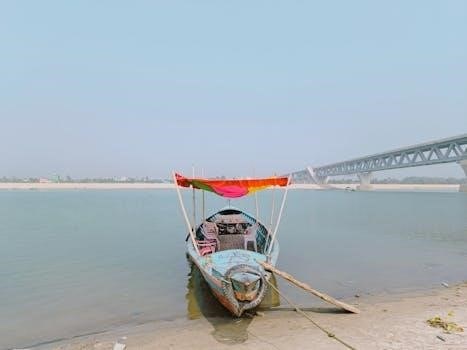Overview of “The Odyssey” by Homer (Robert Fitzgerald Translation)
Homer’s The Odyssey, in Robert Fitzgerald’s acclaimed translation, stands as a cornerstone of Western literature. It narrates Odysseus’s arduous journey home after the Trojan War, showcasing his resilience against mythical creatures and divine challenges, highlighting civilization’s importance.
Significance of Robert Fitzgerald’s Translation
Robert Fitzgerald’s translation of Homer’s Odyssey holds immense significance, solidifying its place as a beloved and standard version for generations. His work beautifully captures the epic poem’s essence, making it accessible to modern readers while preserving its classical grandeur. Fitzgerald’s rendition is celebrated for its poetic language, rhythmic flow, and engaging narrative, offering a captivating reading experience.
Since its publication in 1961, Fitzgerald’s translation has sold millions of copies, becoming a staple in academic settings and among general readers. It strikes a balance between accuracy and artistry, rendering Homer’s story in a way that resonates with contemporary audiences. His translation emphasizes the beauty and importance of rituals, demonstrating their profound impact on ancient Greek society. Fitzgerald’s work continues to be admired for its enduring quality and its ability to bring Homer’s epic to life.
Why Fitzgerald’s Translation is Popular
Robert Fitzgerald’s translation of The Odyssey enjoys enduring popularity due to its unique blend of accessibility and poetic artistry. Unlike more literal translations, Fitzgerald prioritizes readability and narrative flow, making the epic poem engaging for modern readers. His use of vivid language and evocative imagery brings Homer’s world to life, captivating audiences with Odysseus’s adventures and struggles.
Fitzgerald’s translation resonates because it captures the emotional depth of the characters and the thematic richness of the story. It balances fidelity to the original text with a contemporary voice, making it a favorite among students, scholars, and casual readers alike. The translation avoids archaic language, ensuring that the story remains accessible and relevant to successive generations. Its widespread adoption in classrooms and literary circles further solidifies its popularity.

The Epic Journey of Odysseus
Odysseus’s journey, vividly rendered in Fitzgerald’s translation, embodies perseverance and cunning. His decade-long voyage home is fraught with peril, mythical encounters, and divine intervention, testing his resolve and shaping his legendary status, read this odyssey by robert fitzgerald pdf.
Odysseus’s Wanderings (Books 9-12)
Books 9 through 12 of The Odyssey, masterfully translated by Robert Fitzgerald, recount Odysseus’s fantastical wanderings. These captivating narratives detail his encounters with mythical beings and perilous landscapes.
The journey begins with the Lotus Eaters, who offer a tempting escape from reality. Subsequently, Odysseus faces the Cyclops Polyphemus, blinding him in a daring escape from his cave.
His travels lead him to Aeolus, the wind king, and then to the land of the Laestrygonians, giant cannibals who destroy all but one of his ships. Circe, the enchantress, turns his men into swine before eventually aiding Odysseus on his quest.
Odysseus ventures into the Underworld, seeking guidance from the prophet Tiresias. He navigates past the deadly Sirens, whose alluring songs tempt sailors to their doom. Finally, he braves the treacherous passage between Scylla, a six-headed monster, and Charybdis, a deadly whirlpool.
These trials, vividly portrayed in Fitzgerald’s translation, exemplify Odysseus’s courage, cunning, and resilience in the face of unimaginable adversity. Each episode contributes to the epic scope of his journey home.
The Ten-Year Trojan War Background
The Odyssey, translated by Robert Fitzgerald, is inextricably linked to the ten-year Trojan War. This conflict serves as the backdrop to Odysseus’s extended journey home, shaping his character and influencing the challenges he faces.
The war began when Paris of Troy abducted Helen, the wife of Menelaus, King of Sparta. This act sparked a massive military expedition by the Achaean (Greek) forces to reclaim Helen and avenge the insult.
Odysseus, King of Ithaca, played a crucial role in the war, known for his cunning and strategic brilliance. He devised the famous Trojan Horse, a clever ruse that allowed the Achaeans to infiltrate and conquer the heavily fortified city of Troy.
The war’s prolonged duration and devastating consequences left many Achaean heroes weary and eager to return home. However, their homecoming was often fraught with peril, as exemplified by Odysseus’s ten-year voyage.
The Trojan War’s impact resonates throughout The Odyssey, reminding us of the cost of conflict and the enduring desire for peace and reconciliation. It sets the stage for Odysseus’s personal odyssey, a testament to his resilience and determination.

Key Themes and Motifs
The Odyssey, in Fitzgerald’s translation, explores key themes like homecoming, loyalty, and revenge. Recurring motifs include divine intervention, hospitality, and the struggle between civilization and barbarism, enriching the epic narrative.
The Importance of Civilization and Rituals
In Robert Fitzgerald’s translation of The Odyssey, civilization and rituals are not mere background elements but integral components that shape the narrative and define its characters. Homer emphasizes the significance of these practices, highlighting their role in maintaining order and societal harmony. Feasting, sacrifices, and proper burial rites are depicted as beautiful and vital aspects of life, and their violation carries severe consequences.
The epic contrasts the civilized world of the Greeks with the barbaric realms encountered by Odysseus, such as the land of the Cyclops. These encounters underscore the importance of social norms, respect for the gods, and adherence to established customs. Odysseus’s struggles often stem from breaches of hospitality or disregard for divine law, emphasizing the need for moral conduct and respect for tradition.
Fitzgerald’s translation captures the nuances of these cultural practices, conveying their profound meaning to ancient Greek society. By emphasizing the beauty and necessity of civilization and rituals, Homer’s epic provides a timeless commentary on the foundations of human society.
Divine Intervention in Odysseus’s Journey
In Robert Fitzgerald’s translation of Homer’s The Odyssey, the gods actively shape Odysseus’s fate. Athena champions Odysseus, guiding and protecting him, while Poseidon, angered by Odysseus’s blinding of Polyphemus, relentlessly hinders his return. This divine intervention underscores the ancient Greek belief in the gods’ power over human lives.
The gods’ actions are not arbitrary but often reflect their moral judgments. Athena rewards Odysseus’s cunning and piety, while Poseidon punishes his hubris. These interventions highlight the importance of respecting the gods and adhering to divine law. The epic portrays a world where human actions have cosmic consequences, and the gods ensure that justice is served.
Fitzgerald’s translation captures the grandeur and complexity of these divine interactions, emphasizing their profound impact on Odysseus’s journey. The gods’ involvement adds depth and drama to the narrative, reminding readers of the epic’s exploration of fate, free will, and the relationship between humans and the divine.

Availability and Access
Robert Fitzgerald’s translation of The Odyssey is widely available in print and digital formats. Access to a PDF version can be found through online booksellers, libraries, and various educational resources, facilitating study.
Finding “The Odyssey” by Robert Fitzgerald in PDF Format
Locating “The Odyssey” translated by Robert Fitzgerald in PDF format is achievable through several online avenues. Many online booksellers offer digital versions of the book, often including the PDF format. Libraries frequently provide access to e-books, which may include “The Odyssey,” through their digital lending services. These platforms require a library card for access.
Educational websites and online learning platforms sometimes host PDF versions of classic literature for students. Ensure that any downloaded PDF is from a reputable source to avoid copyright infringement or malware. Project Gutenberg, while primarily offering plain text versions, can sometimes link to PDF versions hosted elsewhere.
When searching, use specific keywords like “The Odyssey Robert Fitzgerald translation PDF” to narrow results. Always verify the legitimacy of the source before downloading to ensure a safe and legal acquisition.
Online Resources for Studying the Text
Numerous online resources are available for studying Robert Fitzgerald’s translation of “The Odyssey.” Websites like SparkNotes and CliffsNotes offer detailed summaries, character analyses, and explanations of key themes. University websites and online learning platforms often provide lecture notes, study guides, and scholarly articles related to the epic poem.
Online forums and discussion boards dedicated to literature can be valuable for engaging with other readers and sharing insights. JSTOR and other academic databases provide access to scholarly analyses and critical essays. YouTube hosts lectures and discussions on “The Odyssey” by professors and literary experts.
Many websites offer interactive quizzes and exercises to test your understanding of the text. Online concordances and dictionaries can help with unfamiliar vocabulary and references. Remember to critically evaluate the sources you use to ensure accuracy and reliability.

Study and Analysis Resources
To deepen understanding of The Odyssey translated by Robert Fitzgerald, explore study guides, critical essays, and online forums. Analyze themes, characters, and literary devices. Consider historical context and scholarly interpretations for a comprehensive analysis.
Assignments and Study Questions
Engage deeply with Robert Fitzgerald’s translation of Homer’s Odyssey through thoughtfully designed assignments and study questions. Explore Odysseus’s character arc, analyzing his strengths and flaws in overcoming challenges.
Consider the role of divine intervention, evaluating how gods and goddesses influence the epic’s events. Discuss the significance of loyalty, hospitality, and revenge as recurring themes throughout Odysseus’s journey.
Investigate the cultural context of ancient Greece, researching the values and beliefs that shape the characters’ actions. Compare Fitzgerald’s translation to other versions, assessing its accuracy and artistic merit.
Examine the epic’s structure, identifying key plot points and their contribution to the overall narrative. Craft essays that delve into specific aspects, such as the portrayal of women or the symbolism of particular settings.
Prepare presentations that explore the enduring relevance of The Odyssey in contemporary society, linking its themes to modern issues and experiences, fostering critical thinking.
